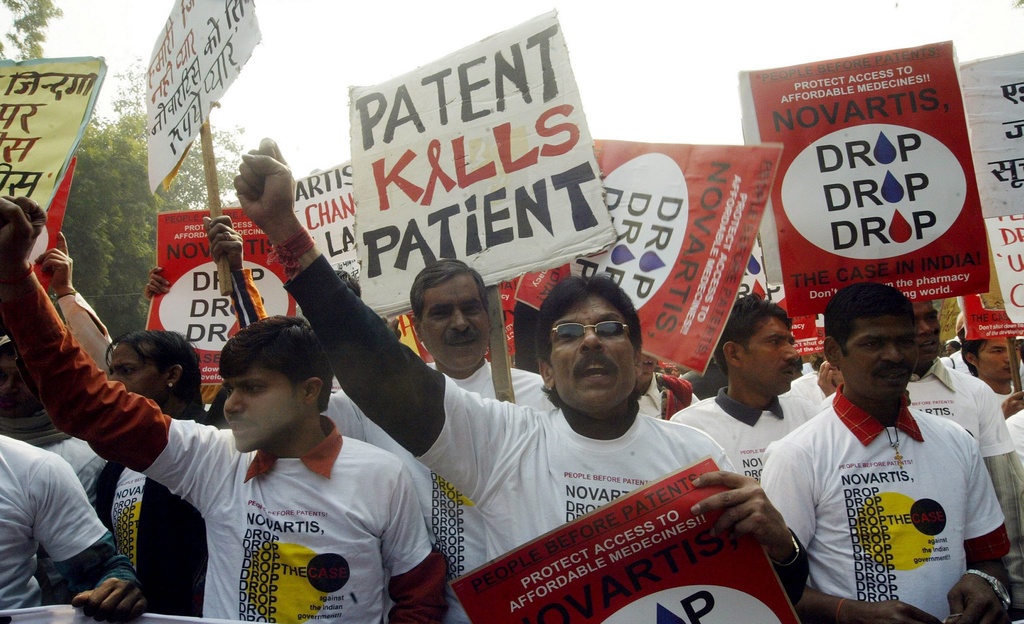
Novartis awaits cancer drug ruling in India

India’s Supreme Court is to rule later this month on patent protection for a cancer drug in a bitter legal battle involving Swiss pharmaceutical giant Novartis.
Advocacy groups have been campaigning against Novartis on the Indian Glivec/Gleevec issue since 2007, accusing the company of “evergreening”, or extending patent terms by making minor changes in existing medicines.
The campaigners – including Berne Declaration, Oxfam and Doctors Without Borders/MSF – see this as a test case in which a Novartis victory would weaken the Indian generics industry, relied upon by NGOs for affordable drugs, by widening the patent conditions applied in the country.
“If Novartis won the case, patents would be granted in India as broadly as they are in wealthy countries and on new formulations of known medicines already in use. India would no longer be able to supply much of the developing world with quality affordable medicines,” MSF argues.
This doomsday scenario is dismissed by Novartis, which wants to see India come into line with other drug-producing countries. It says generics manufacturers will still be free to produce drugs that come off patent.
But drugs can also be forced off patent early in India, as the German drug maker Bayer discovered this week when it came out on the losing side of a landmark drug ruling by the Indian patent authority.
Bayer has been forced to grant a licence to a local generics manufacturer for its expensive cancer drug Nexavar after the patent body decided the kidney and liver cancer medicine was priced beyond the reach of patients. This is the first time this legal provision has been applied.
Like Bayer, Novartis says it is just seeking to protect its intellectual property. “We do not want people to copy our substance without having done any research and then distribute the product cheaply and ruin our business,” Paul Herrling, head of corporate research at Novartis, told Swiss television in a recent interview.
What’s new?
At the heart of the argument is Imatinib, a molecular compound developed by Novartis in 1993. Imatinib was further developed into the global best-seller Glivec/Gleevec, and has been patented in 40 countries.
India only introduced pharma patenting in 2005, with a specific provision excluding patent protection for modifications to existing drugs. The majority of applications for pharma patents in Europe fall into this “new improved” category. Novartis vigorously maintains that Glivec does not.
“This process, which took years, was more than just an incremental improvement – it was a breakthrough – and certainly cannot be interpreted as ‘evergreening’,” the company states on its website.
However, prompted by opposition from generic drug companies and the Indian Cancer Patients Aid Association, an Indian patent office rejected the Glivec patent application in January 2006 on the grounds that it was a form of the pre-existing Imantib and did not represent a true innovation with “improved efficacy”.
That decision sparked the legal saga which is expected to be concluded once and for all by the Supreme Court on March 28. But why go so far?
“Novartis has often been at the forefront of shaping the regulatory environment,” pharma analyst Karl Heinz Koch of Helvea told swissinfo.ch.
India matters not only because of its generics industry but also because of its value as a market.
“India by its sheer population size is one of the most significant emerging markets. There is a middle class which can easily afford even the higher cost cancer treatments like Glivec,” Koch said.
Open for business
The campaigners accuse Novartis of attacking “the pharmacy of the developing world” but Novartis disputes this description of India, pointing out that the country’s generic companies sell more medicines in wealthy countries than elsewhere.
Michelle Childs of MSF told swissinfo.ch that this view was nonsensical. “That is a very strange statement for Novartis to make because MSF, UN Aids, the Global Fund and PEPFAR [President’s Emergency Plan for AIDS Relief] all source over 90 per cent of their ARVs [HIV drugs] from India and other medicines for malaria and increasingly vaccines.”
In a written response to swissinfo’s question on how it could stand over that claim, Novartis reiterated the points made in its position statement on the case, available through a link on its homepage.
“The reality is that Indian generic companies chiefly export their products to markets where they can sell their products at a profit,” the Novartis statement reads.
“Improving access to healthcare is about more than affordability. Access to medicines has political, economic and even logistical barriers,” it continues.
HIV risk
Novartis says the Glivec case is “about gaining clarity on the application of patent law in India, which is important to the economic future of the country”.
It is no coincidence that India, as the world’s leading exporter of generic medicines, wishes to limit access to patent protection as much as possible under international law.
The concern of the NGOs is that a Novartis victory will mean more drugs eligible for patent protection in India, putting them out of reach of poor patients worldwide.
“Because for example we need fixed-dose combinations where you combine many pills into one or we need child friendly versions of medicines. Now [if the law were to change] with those sorts of adaptations people could apply for patenting,” Childs said.
A “false and misleading” argument, according to Novartis, which maintains that access to medicines, including HIV/Aids medications is not threatened by the case. “Currently available generic drugs launched in India before 2005 will continue to be available… regardless of the legal outcome of our case.”
With both sides in the business of saving lives, albeit in very different roles, it is clear that passions are running high as the New Delhi judges take to the bench.
India subscribed to World Trade Organization rules on intellectual property on January 1, 2005. But the country’s own patent laws deny protection to drugs that were patented before 1995 or are modifications or new forms of old medicines.
The Indian authorities have denied Novartis patent protection for the beta crystal, the active ingredient of Glivec, ruling that it is an adaptation of an existing compound. The crystal has been granted protection in 40 other countries.
Novartis says 95% of Glivec users in India get the drug free, but NGOs counter that generic versions of Glivec are one tenth of the price. They say there are 25,000 new cases of chronic myeloid leukaemia in India every year.
Novartis launched Glivec (or Gleevec in the US), which halts the spread of cancer cells related to the blood disease chronic myeloid leukaemia and certain rare forms of gastrointestinal cancer, in 2001.
Last year Novartis said sales of Glivec reached $4.7 billion.
Glivec controls but does not cure the cancer and therefore requires treatment for life.
Annual treatment costs $40,000 to $98,000 depending on disease and dosage.

In compliance with the JTI standards
More: SWI swissinfo.ch certified by the Journalism Trust Initiative





























You can find an overview of ongoing debates with our journalists here . Please join us!
If you want to start a conversation about a topic raised in this article or want to report factual errors, email us at english@swissinfo.ch.